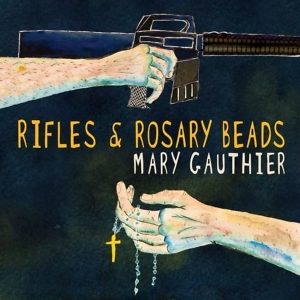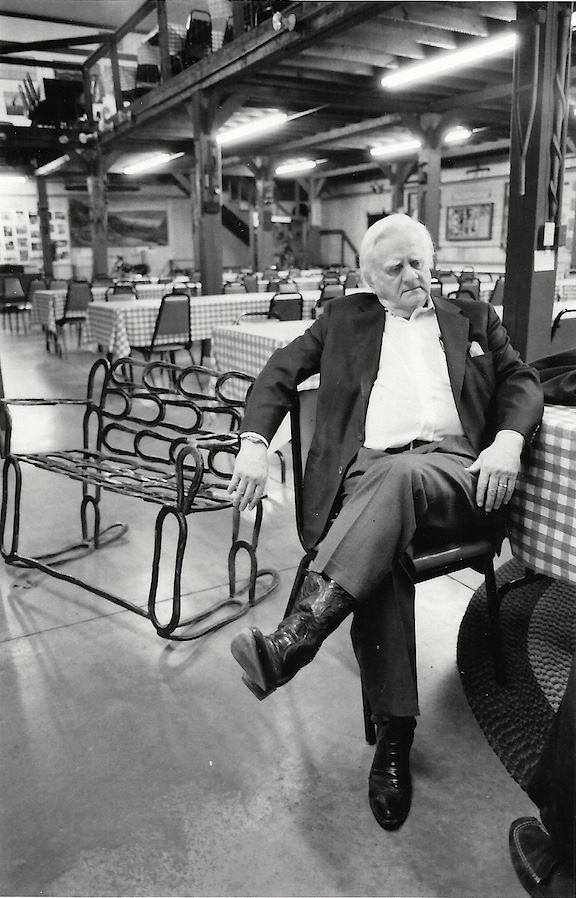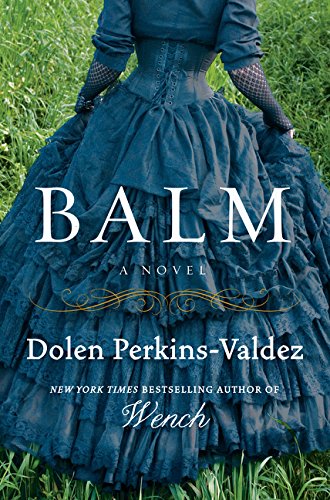Saved by a Song
Mary Gauthier talks with Chapter 16 about becoming your own witness
Nashville singer-songwriter Mary Gauthier is having a year. Her new album, Rifles and Rosary Beads, has been featured by CBS Sunday Morning, I Love You America with Sarah Silverman, the Los Angeles Times, and the Oxford American, among others. The album was entirely co-written with American veterans at retreats sponsored by SongwritingWith:Soldiers, a nonprofit dedicated to helping traumatized veterans and their families heal through songwriting. When Gauthier launched Rifles and Rosary Beads at the Franklin Theatre in February, Josh Geartz, an Iraq war veteran, joined her onstage to play harmonica on “Still on the Ride,” the song they wrote together.

In addition to touring in support of the album, Gauthier also signed a contract with St. Martin’s Press for a memoir about her own experience of trauma and recovery. Any book deal is a cause for celebration, but this one was particularly sweet: Yale University Press signed the same book three years ago but rejected the finished manuscript, and Gauthier sees the new book deal as “a miracle.”
In this interview, outtakes from a conversation at my kitchen table in connection with an article I was writing for The New York Times, Gauthier talks about addiction, songwriting, second chances, how fiction conveys truth, and a literary lunch at Gramercy Park that was a dream come true.
Chapter 16: You write a lot about addiction. How does your own story of recovery affect the veterans you worked with for Rifles and Rosary Beads?
Mary Gauthier: Here’s the thing, I’ve been sober a long time—twenty-seven years. Back when I used to get high and drink, I remember being at a bar in Baton Rouge called The Brass Rail, and that’s where the bikers hung out. And a lot of the bikers were Vietnam vets. I didn’t understand what that meant or the impact of that. I was eighteen, maybe nineteen.
I had an old guitar, and this bar had thirty-five-cent drinks. It was the nastiest, rot-gut, awful whiskey, but it was thirty-five cents a shot. So, you can imagine the environment: it was drunk heaven. At a certain point in the lubrication process, I would go to my parents’ old car—I was driving an old station wagon that belonged to my mom and dad. I’d put the tailgate down, sit on the back of the tailgate, and I’d play John Prine’s “Sam Stone.”
This drew the bikers, the Vietnam vets, to me. And I remember an old guy. His name was Grizzly, a big guy. He looked like a bear. He had a beard. He had chains. He had leather. He was huge! And I’d play “Sam Stone,” and he’d take that thirty-five-cent whiskey, and he’d shoot it down. He’d take the cup and he’d crush it. And he’d say, “Damn it! Play it again!” He just wanted to hear “Sam Stone” over and over again. John Prine was their hero, and that song was a life jacket to them. They wanted to hear it, and I wanted to play a song they wanted to hear. It taught me a lot as a songwriter.
I wasn’t able to be a songwriter yet. I had to get sober, and that wasn’t going to happen for another decade. And then, after I got sober, I needed another decade to recover. I didn’t come to Nashville until I was forty. But I had that formative experience of what a song can do. And then when I got invited to work with the veterans, I knew the way to do it would be to do what John did: go to the real stories.
Now, it’s complicated. There was never a Sam Stone; John made him up. It’s a fictionalized account of a veteran’s experience, but it’s as true as it gets, which gets to the nature of fiction. Great fiction is the truth even though it’s not fact.
Chapter 16: A lie that tells the truth.
Gauthier: It’s the lie that tells the truth. So a lot of these veterans’ stories do exactly that, and they love that. They get that: “That didn’t happen to me exactly, but it happened to a lot of other people, so let’s put that in there.” We’re not doing journalism; we’re doing art.
 Chapter 16: The new album is getting so much national coverage right now, but you aren’t just a songwriter. You also have a book in the works.
Chapter 16: The new album is getting so much national coverage right now, but you aren’t just a songwriter. You also have a book in the works.
Gauthier: It’s coming from St. Martin’s Press. I went to New York and met with them—they took me to a literary lunch at the Gramercy Tavern. That’s my dream, you know. They said, “Where do you want to go?” and I said, “Take me to a literary lunch where you guys take your writers.” And so we went to Gramercy Tavern, which was perfect, and then we went to the Flatiron Building and went up to the nineteenth floor, and I saw their office. It’s a miracle. I mean, I can’t believe it: I got a real book deal, and it’s going to be called Saved By a Song.
Chapter 16: Oh, I love that!
Gauthier: I’m going to talk about transformation through recovery. I think recovery is fundamental—none of this would have happened if I hadn’t gotten sober and stayed sober.
Recovery involves work for me. I have to stay close to twelve-step programs and other sober people—that’s absolutely fundamental—but after that I need purpose. And my purpose was given to me through songwriting. It’s about recovery and songwriting, and so the book is called Saved by a Song.
It’s going to be about the call, the pull, to write songs that are challenging to listen to, about letting the woundedness seep into the songs, be witnessed by the listener, and have the listener say, “Me too.” And that lets the wounded person—which for the longest time was me—know that I’m not alone. When you tell your story, you become the storyteller, which distances you some from being the victim. If your story is one of trauma, there’s a part of you that believes you are your story. You identify so closely with the woundedness that you think you are the woundedness.
That’s the beauty of art—of all art: songs or literature or painting or pottery, anything—if you pour your soul into it, you get to step back and become your own witness, and that’s a transformative thing. The storyteller has power. The storyteller has agency. The storyteller takes a step back from the story and tells the story from a position of strength, even if it’s the hardest story ever told. You don’t just bleed all over people.
Chapter 16: There’s shape.
Gauthier: Art has to have structure, and there’s things that have to happen, and it has to be crafted. You have to understand craft as well as art. You don’t just read people your journal. That’s not going to create empathy. It’s going to disturb, and not in a good way. Voyeurism and empathy are different things. To bring someone into the experience of another is a profound thing.
Chapter 16: Do you have a tentative publication date for the book?
Gauthier: We haven’t gotten there yet. I’m on tour this year—I’m booked all the way through November.
Chapter 16: So, you can’t even start writing the book yet.
Gauthier: Well, I wrote a book for Yale; Yale gave me a book deal three years ago.
Chapter 16: I remember that, but your editor left and there was some kind of….
Gauthier: Steve Wasserman left Yale, and the outside reviewer said, “This isn’t what Yale does. There’s too much memoir here; there’s not enough instruction. There’s hundreds of years of established music theory,” the outside reviewer said. I’m like, “Dude.”
Chapter 16: They sent it to the wrong reader.
Gauthier: I don’t have music theory, but neither did Johnny Cash or Hank Williams, and it didn’t seem to mess up their music. So the book was rejected by Yale, but Steve, God bless him, got me my advance and I got to keep it because he said, “Look, this is the book we signed her up for, so you’re not going to make her give it back.” It’s not much money because it’s a university press, but basically I got paid to write that book.
And that book is going to be the foundation of what I’m doing with St. Martin’s. But the joy of St. Martin’s is that they’ve said, “We want memoirs. We want story. We want you to quote John Prine.” Yale was like, “You can’t quote any other songwriters because we can’t afford to pay the publishers for the use of the lyrics.” St. Martin’s is like, “Quote away—bring on the songs that moved you, point to the lines, give us the story behind who Mary Gauthier is and how you became that.” They want more story, which is perfect.
So 2019 is when I see myself really getting into the writing. But we haven’t agreed on a due date yet. Thankfully they said, “Look, we want a great book; we don’t want a quick book.”

Margaret Renkl is the editor of Chapter 16 and a contributing opinion writer for The New York Times. Her first book, an essay collection, will be published by Milkweed Editions in 2019.




